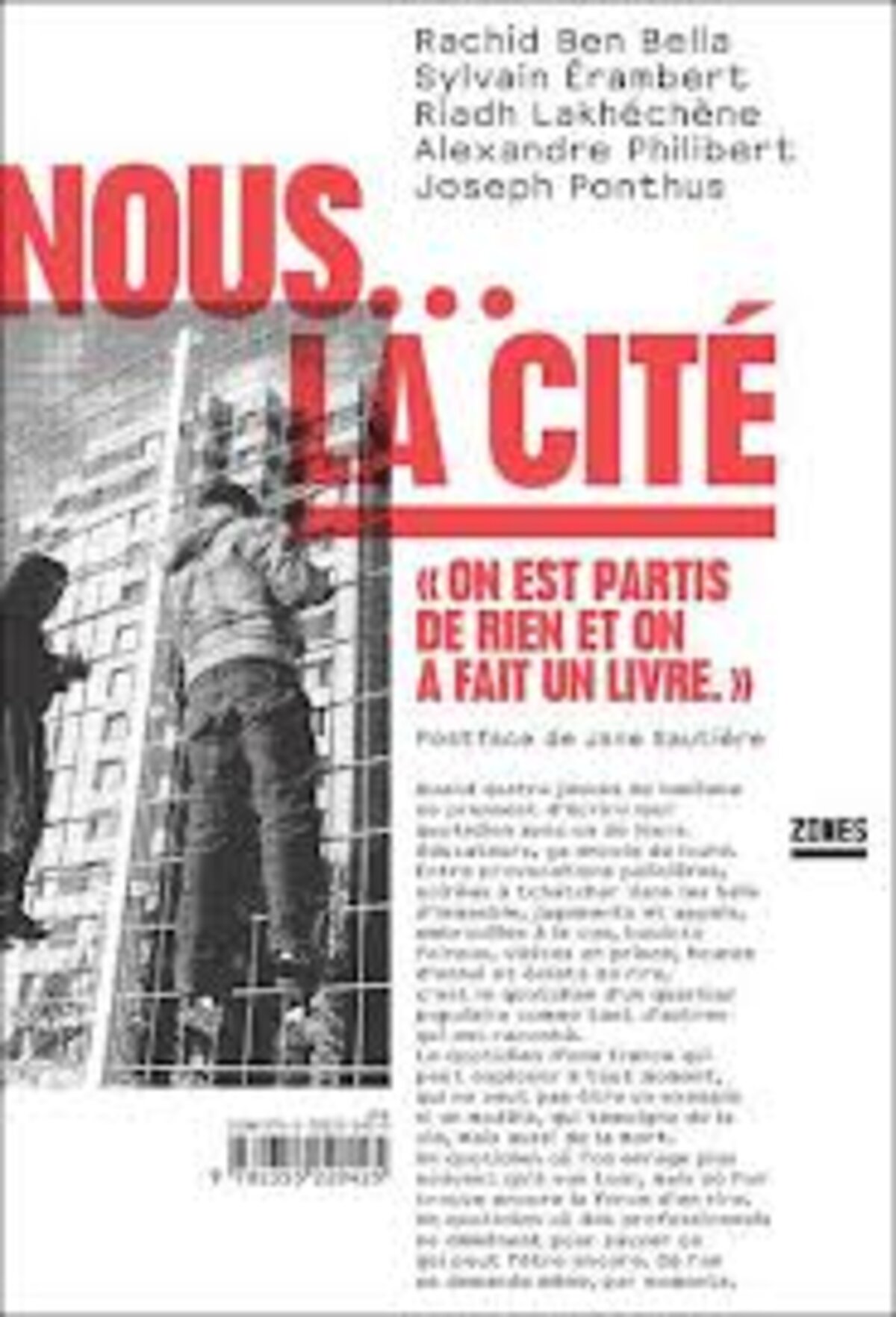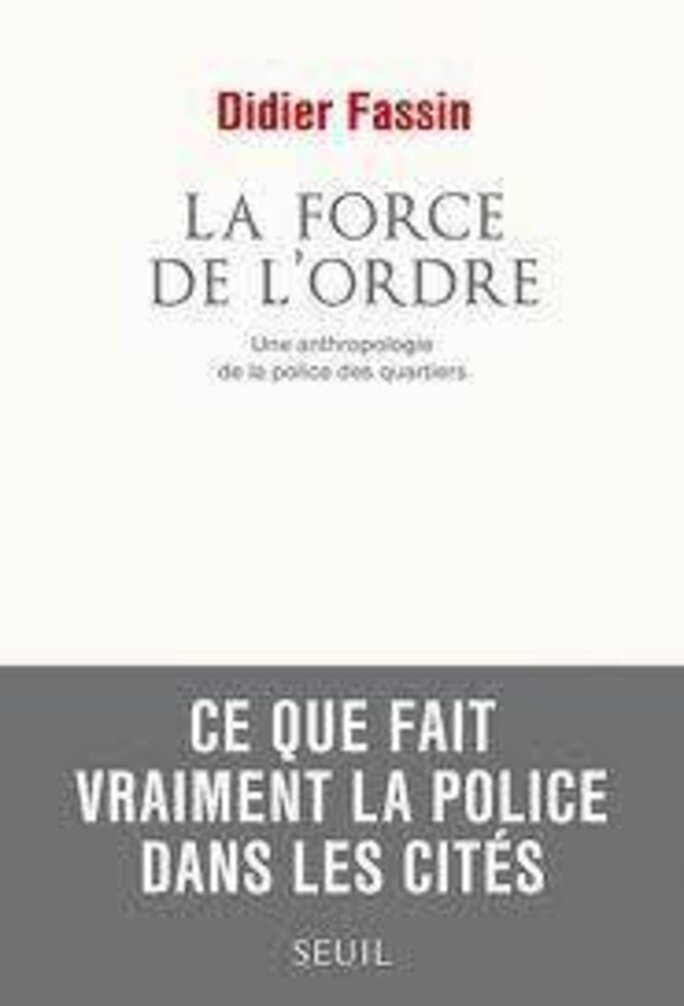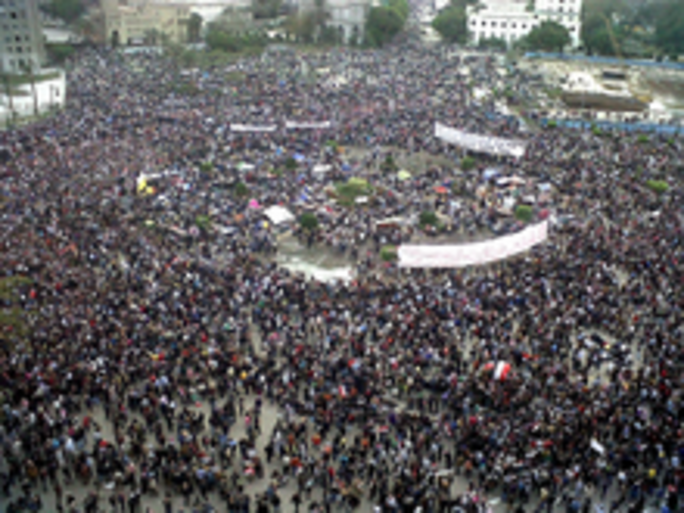
A powerful new book written by four young men from one of France's run-down housing estates has recently been published. The work, entitled 'Nous...La cité' ('We...the estate'), describes the everyday lives of Rachid Ben Bella, Sylvain Érambert, Riadh Lakhéchène and Alexandre Philibert and that of their community youth worker Joseph Ponthus on an estate in Nanterre, in the western suburbs of Paris. The book sprang from a project carried out by Ponthus, with extracts from the four men's writings being published in Article 11 magazine, before being published as a book by publishers éditions Zones.
The result is an extraordinary work which does not just shed light on the lives of France's blighted housing estates but has also shown four men from difficult backgrounds the impact of the written word. 'In fact it's good to write, you can say everything, and what's more, as my mother can't read I can say even more,' one of the young authors explained to Ponthus.
The book can be read in at least four different ways. On one level it is a straightforward thematic look at everyday life on the estates: the four writers' experiences with school, the police, religion, prison, drug dealing and, in a more roundabout way, their families and private lives.
The school comes first, where the separation from the institutional framework of life that is a constant theme of the book, starts early. It is at school where “in any case, there comes a time when they are so fed up with you that they pass you [editor's note, allowing you to move on to the next year] just so they don't have to have you any more, moreover it's as if they are saying 'what did you expect to do with us?' We are even excluded from the detention room.”. It is also at school, writes one of them, where “you arrive in the 'third year springboard class' as it is called officially, to give you a chance to make a fresh start, but I'm sure they call it 'springboard' because they don't look after you and they quickly make you jump off”.
Next come the police, who are ever-present in the minds and daily lives of the authors, and who are accused of every bad thing and of provoking everything, especially when one of the youngsters in their gang is killed in a chase with a car from a Brigade anti-criminalité (BAC), a controversial section of the national police force charged with maintaining law and order, especially in housing estates. Police officers are, however, differentiated by the authors from gendarmes (1) who “when they come to look for you at your place, don't go over the top, they simply ask you to go with them, they don't handcuff your father or your mother, they address everyone politely, they almost apologise for doing their job. What's more, you know that you'll eat well when you're in custody.”

In its passages on the police Nous...La cité is like the flip side of sociologist Didier Fassin's book 'La Force de l'ordre' ('The Force of Order'), published in 2011, in which he followed the patrols of a BAC based in Paris. In Nous...la cité one finds references to the Algerian War, for the young on the estate compare the “Arab cops” - French police of North African origin – to “Harkis, the traitors”, referring to the Algerians who served in the French Army during the war in Algeria. A collective colonial memory is being passed down the generations in a way that provides a framework for understanding the current situation. “People forget too quickly the shanty towns, the racial attacks, of people being thrown into the [River] Seine,” says one of the young authors. “I come from Nanterre, so I know my history. I've listened to what the old folk said. And in my turn I always remind the guys about it.”
We see in this work – as in Fassin's – the almost implacable opposition between these youths deeply rooted in their estate since their birth and the police who are often originally from rural areas and who “arrive from who knows where with their southern accents”.
The book also gives a frank description of the many ways that money is brought into the estate. Firstly theft, for which Rachid insists there exists a form of ethics as he describes where and when the thefts are carried out. “With theft, for each thing that you want to steal there is a place to go,” he writes. “For jewellery, it's mainly flats in 78 [the département or county of Yvelines, to the west of Paris, and whose capital is Versailles] or nice houses. For technology, computers, it's around La Défense [a major business area of west Paris] or industrial zones. For phones, it's from people but careful, never using violence! It's the same with shops. I have always been ashamed of stealing during opening hours. There is a time to buy and a time to steal. Me, I don't steal from shops that are open.”
The pages devoted to describing drug dealing are particularly detailed. Rachid refers to the “young kids” from the nearby well-heeled areas of Chatou and Choisy, whom they give free samples or offer discounted prices. “In fact, it's a real capitalist endeavour,” he explains. “It's all about the money, the customer is king and you need them to come back.”
He then describes the area they work in, a “place that cannot operate on less that five thousand euros a day”. This is because they have to pay for the lookouts, the face-spotters – people good at recognising and remembering faces – the seller “who doesn't budge from the stairs”, the “loader/unloader”who brings the drugs every hour or two hours and who takes back the money, plus the “safe houses” where they can hole up in case of a raid, which are not to be confused with the “nurseries” where the drugs are stashed. “People say it's easy money but in fact that's not true. It's not easy money it's fast money,” Rachid explains. The cannabis is sold inside the estate, unlike cocaine which is delivered directly to flats in upmarket areas where “people have rare first names like Constantin and surnames from good families”.
However, contrary to the common idea that crime linked to drug trafficking is much more violent and anarchic than the days of the 'godfathers', one passage in the book maintains that “as for the settling of scores, sure, it's spoken about these days, but I really think that it's less serious than before. For example until the end of the 1990s there was no dealer who wasn't armed, which is no longer the case today”.
Next, and quite logically, comes a discussion of prison. “In fact, to define prison I'd say that it's as if you are on the estate, but a more condensed estate, everything is more intense. The junkies are more junky, the nutters are even nuttier”. In particular the book contains the explosive “diary from the cooler” written by Rachid, with its vocabulary that is understandable only to the initiated. “The rain is no longer falling” is an expression used to beat the prison post censors and means that none of the parcels thrown over from the outside are reaching the exercise yard any more. “Stamp greets you with the spaghetti” [editor's note, the French for stamp used here is 'bretin', a slang version of the usual word 'timbre'] means that with the letter a mobile phone SIM card has been put inside a packet of spaghetti.
-------------------------------
1: The National Gendarmerie is a separate branch of the forces of law and order from the national police force. Gendarmes are technically part of the France's Armed Forces though political responsibility for them was moved from the Ministry of Defence to the Ministry of the Interior in 2009. Generally the Gendarmerie is responsible for law and order in rural areas and towns with a population of under 20,000.
'You see all of France'
Yet another way of looking at this book is as a plunge into the very different world of the community youth workers – 'éducateurs de rue' in French – whose work was first regulated by an official decree in July 1972. They are different from other social workers in that they don't have a job that is defined by the category of people they deal with, but instead they have a free-ranging role in the geographical area in which they work. In this way they are able to help anyone they find inside their so-called 'intervention zone'. Another difference is that their contact with young people is based on the principle of 'voluntary involvement' in the support projects they offer; to the point where the young people remain free to withhold their real identity. “In a society where we think we should know everything about someone before even taking the trouble to meet them, it's hard for people to grasp that one sometimes has to wait several years before a young person – someone whom one meets every day – chooses to reveal their real family name,” says Joseph Ponthus.
We learn how his daily life consists of producing innumerable official statements, conducting prison visits, attending regular court hearings and of problems maintaining contact with certain young people, but also how it involves conversations of a quite incredible intensity or humour. For example, here are Rachid's comments about the career chosen by Joseph Ponthus: “I know why you chose community work as a profession. You would never had had the balls to be a yob, and certainly you could never have been a cop. So there, here you are, in between the two...”
Next, if you read between the lines, another way to interpret Nous...la cité is as a history of French society in recent years as seen from run-down housing estates. This is because “as a drug dealer you really see the poverty,” says one of the authors. “There are the morning customers, they are different, they smoke in the day to keep them going at work, while for the evening customers it's more about unwinding. And then there's another type of customer, the 'fifth of the month customers'. They are those on the minimum wage, on benefits, who blow a large amount of their pay on the fifth of the month [editor's note, when many benefits get paid].” The writer concludes: “You see everything, all layers of society. It goes from 12-year-old youngsters to people so old that you'd say they must have done the Haj [editor's note, the pilgrimage to Mecca that should be made once in a Muslim's life if they are able to], say 65 or 70. You see the wealthy, junkies, people you've seen on the telly. You see all of France.”

The passage on the riots of 2005 is particularity instructive in what it tells about this “yougataga year [editor's note, the word 'yougataga' has no real definition, even in French, and is a word used by the French rapper Mister You - here it could mean simply rock 'n' roll], this motherfucker police year”. It bluntly reveals both the violence sometimes used by the young people on the estate and the fact that it was not always without political motive. “We started by discussing what should not be burnt,” writes one. “Not people's cars, not the school, not the shopping centre. We wanted to attack the state.” The young people who give their accounts in the book point out that at the beginning “we didn't want it to affect our little business, so we stayed quite calm. In fact it's when you have the least to lose that you are the most determined.”
However, there came a time when they decided to attack a bus station in Nanterre and set it alight. But, they conclude: “We could certainly see that the state was afraid, but what we really lacked was an organisation. There were no meetings, we made it up as we went along. Each estate did its own thing in its own patch. If there had been contacts beforehand, real leaders who would have said 'You, you do that, you, you go there' then things would really have been smoking!”

Again, reading between the lines there are also some hints of the rarely-discussed repercussions that the Tunisian and Egyptian uprisings had on French housing estates. One of the authors writes that “if one day we have to wage war on the cops, I'll do it. If we have to go to place de la Concorde [in the centre of Paris] like they went to Tahrir Square, I will go.” Another explains that “religion, that depends on how you were brought up. Because, to be honest, to tell yourself that god also looks after the [late Libyan dictator Muammar] Gaddafis and [former Tunisian strongman Zine al-Abidine] Ben Alis..."
'The power of words'
Finally and fundamentally, this book is above all an account of the “discovery of the power of words”. Even if there is sometimes in the narrative a slightly irritating tendency towards self-congratulation over the emergence of this writing, the success is real enough. The writing workshop became a book and Rachid, Sylvain, Riadh and Alexandre are able to describe how they have “chatted up chicks by introducing ourselves as writers and have worn out the cops who ask us our profession and have said to them the same thing”.
The work has succeeded in the feat of never hiding the failings of these accounts, which sometimes reveal an astonishing machismo or which sometimes blame institutions in general and the police in particular to explain every problem. But at the same time the young revealed in the book come across - nearly always - as engaging, capable as they are of writing thoughts such as “I think of my future and I see nothing”. Or “There's nothing to say, I had fun, now, with hindsight, if I could do it over again I'd do the same stupid stuff but better. And I'd work again at school, but better.”
It is, though, undoubtedly the final choice of the book's title that allows one to appreciate best how far the authors have come. After the last read-through the four young writers explained to their community worker Joseph Ponthus that the initial title that had been planned 'Nous, la cité' “doesn't correspond to what we want to get across as a message. You see, the comma, it identifies us too much with the estate in general, whereas we just want to give our accounts. So we suggest replacing it with three fullstops. Now, 'Nous...La Cité', that makes things clearer, doesn't it?” After which Ponthus commented: “Fucking hell...Semi-illiterates just a year ago who now quibble over a punctuation mark.”
----------------------------------------
English version: Michael Streeter


